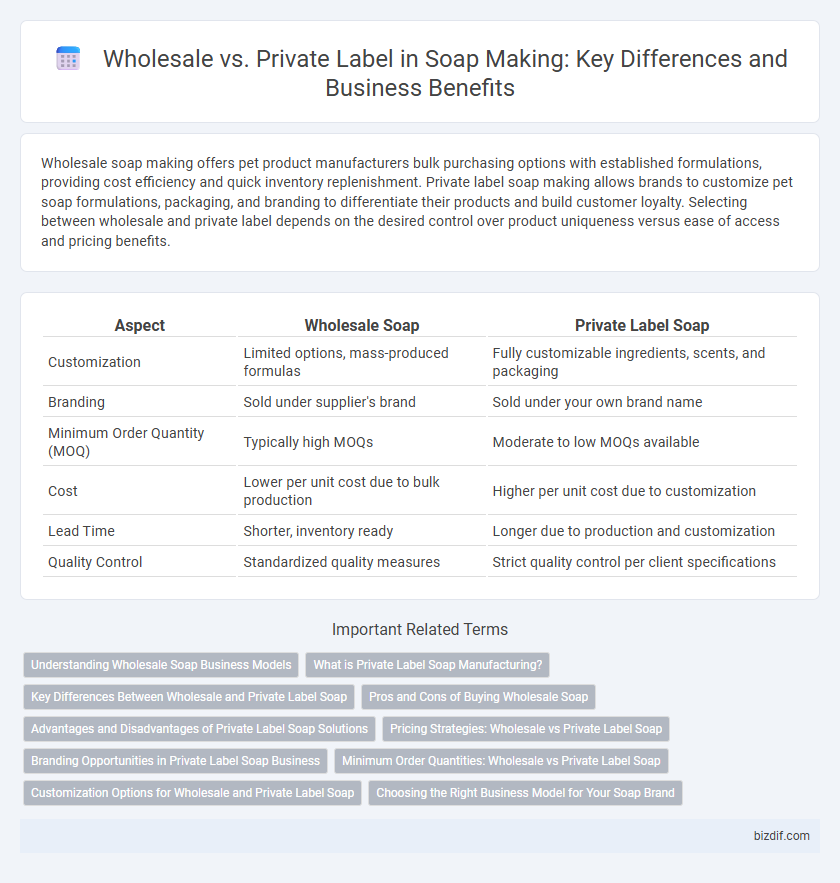Wholesale soap making offers pet product manufacturers bulk purchasing options with established formulations, providing cost efficiency and quick inventory replenishment. Private label soap making allows brands to customize pet soap formulations, packaging, and branding to differentiate their products and build customer loyalty. Selecting between wholesale and private label depends on the desired control over product uniqueness versus ease of access and pricing benefits.
Table of Comparison
| Aspect | Wholesale Soap | Private Label Soap |
|---|---|---|
| Customization | Limited options, mass-produced formulas | Fully customizable ingredients, scents, and packaging |
| Branding | Sold under supplier's brand | Sold under your own brand name |
| Minimum Order Quantity (MOQ) | Typically high MOQs | Moderate to low MOQs available |
| Cost | Lower per unit cost due to bulk production | Higher per unit cost due to customization |
| Lead Time | Shorter, inventory ready | Longer due to production and customization |
| Quality Control | Standardized quality measures | Strict quality control per client specifications |
Understanding Wholesale Soap Business Models
Wholesale soap business models revolve around selling bulk quantities of soap products directly to retailers or distributors, offering competitive pricing and consistent supply. Private label soap involves manufacturers producing customized soap products branded and marketed by retailers under their own labels, allowing personalized formulation and packaging. Understanding these models helps businesses decide between volume-driven sales or brand-focused strategies in the soap industry.
What is Private Label Soap Manufacturing?
Private label soap manufacturing involves creating customized soap products that carry a retailer's brand name but are produced by a third-party manufacturer. This process enables businesses to offer unique formulations and packaging tailored to their target market without investing in production facilities. Leveraging private label soap manufacturing helps companies quickly expand product lines while maintaining control over branding and marketing strategies.
Key Differences Between Wholesale and Private Label Soap
Wholesale soap involves purchasing pre-made soap products in bulk, allowing businesses to sell under the original manufacturer's brand with minimal customization. Private label soap provides companies the opportunity to brand and customize soap formulations, packaging, and scents, creating a unique product line tailored to their market. Key differences include control over product design, branding, pricing flexibility, and the initial investment required for private label versus the lower cost and faster inventory turnover typical of wholesale purchases.
Pros and Cons of Buying Wholesale Soap
Buying wholesale soap offers significant cost savings due to bulk pricing and immediate availability, making it ideal for businesses needing large inventory. However, wholesale options often lack differentiation, limiting branding opportunities and customization that private label soap provides. Additionally, wholesale soap may present challenges in quality control and uniqueness, potentially affecting customer loyalty and market competitiveness.
Advantages and Disadvantages of Private Label Soap Solutions
Private label soap solutions offer businesses the advantage of customizable branding and faster market entry without the need for developing formulas or manufacturing infrastructure. However, these solutions may involve higher per-unit costs and limited control over product innovation or ingredient sourcing compared to wholesale options. Choosing private label allows for unique market positioning but requires careful supplier selection to maintain quality and compliance standards.
Pricing Strategies: Wholesale vs Private Label Soap
Wholesale soap pricing typically involves lower per-unit costs due to bulk production and standardized formulas, making it ideal for retailers seeking competitive margins. Private label soap pricing often factors in customization expenses, branding, and smaller production runs, resulting in higher per-unit prices but offering unique market differentiation. Businesses balance wholesale affordability with private label exclusivity when developing their pricing strategies to maximize profitability and brand value.
Branding Opportunities in Private Label Soap Business
Private label soap businesses offer extensive branding opportunities by allowing companies to customize formulations, packaging, and labeling to reflect their unique brand identity, enhancing market differentiation. Wholesale soap purchasing often limits customization, resulting in generic products that may hinder brand recognition and customer loyalty. Prioritizing private label options enables businesses to build a cohesive brand presence and create exclusive, signature soap products tailored to target audiences.
Minimum Order Quantities: Wholesale vs Private Label Soap
Wholesale soap orders typically require higher minimum order quantities (MOQs), often ranging from 500 to 1,000 units, catering to retailers and large distributors. Private label soap manufacturers generally offer lower MOQs, sometimes as low as 100 to 250 units, enabling small businesses and startups to customize products without large upfront investments. Understanding MOQs is crucial for selecting the right production model based on budget, inventory capacity, and market goals.
Customization Options for Wholesale and Private Label Soap
Wholesale soap offers limited customization options, primarily in fragrance and packaging, catering to bulk buyers seeking cost-effective products with minimal brand differentiation. Private label soap allows extensive customization, including unique formulations, branding, labels, and packaging, enabling businesses to create exclusive product lines tailored to their target market. This flexibility in private labeling supports stronger brand identity and customer loyalty compared to the standardized options available in wholesale soap purchasing.
Choosing the Right Business Model for Your Soap Brand
Choosing the right business model for your soap brand depends on your production capabilities and market goals. Wholesale allows bulk distribution with lower margins but faster scaling, while private labeling offers higher profit margins and brand customization with more control over product quality. Evaluating factors like initial investment, brand identity, and target audience ensures a strategic decision between wholesale and private label models.
Wholesale vs Private Label Infographic

 bizdif.com
bizdif.com